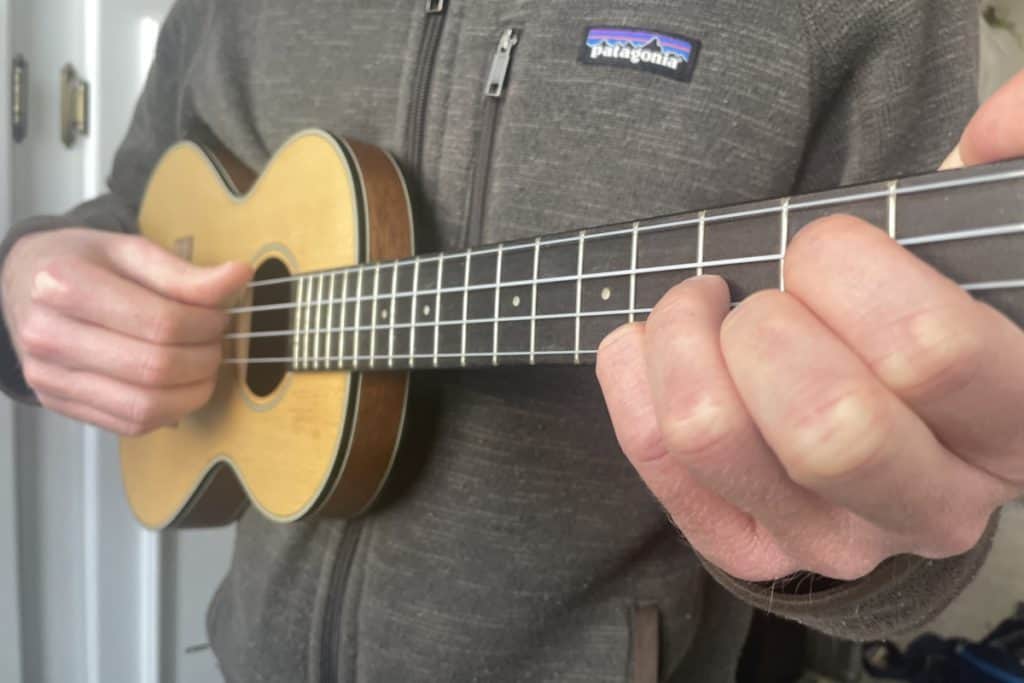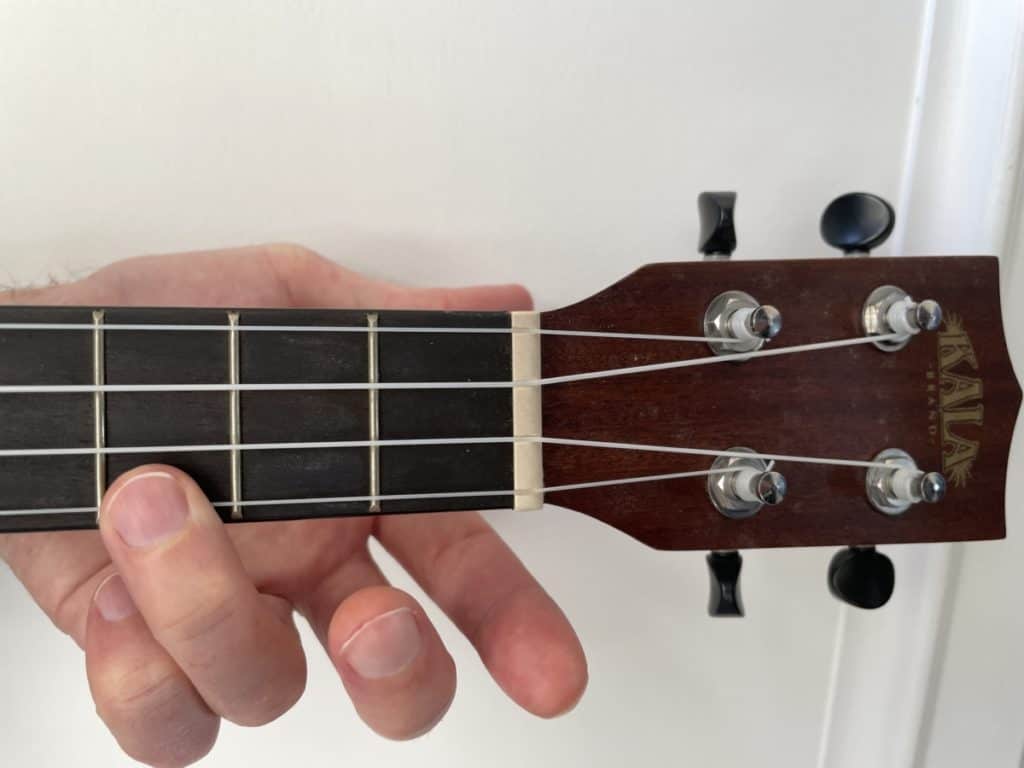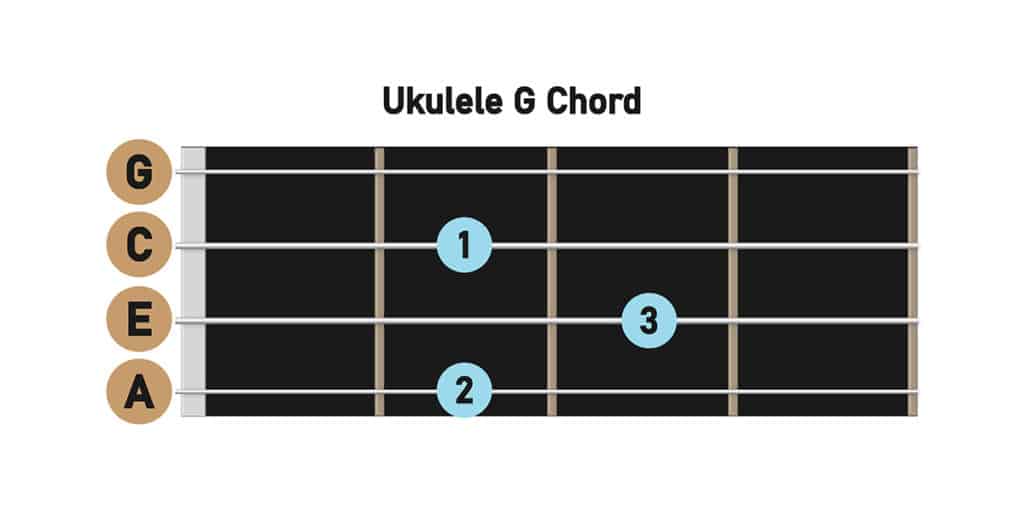Today I’m going to explain whether you can teach yourself ukulele or if getting a teacher is necessary.
I self-taught myself ukulele, BUT before I ever touched a uke, I was already an intermediate level guitar player. That gave me a huge head-start, and I was able to learn the basic chords of the instrument in just a few hours.
I mention this for two reasons:
First, if you have experience with guitar (or other similar instruments), you can probably teach yourself ukulele very quickly.
Second, if ukulele will be your first stringed instrument, then you may want to consider using an instructor more carefully. But more on that below.
Can You Teach Yourself Ukulele?
Let’s start with a very brief overview:
You can learn ukulele without an instructor, by using free online tutorials, tabs and chord charts. In fact, ukulele is one of the easiest instruments to learn on your own, which is why it has become a popular first instrument for students who are completely new to playing music.
That doesn’t mean that working with a ukulele teacher is bad. Not at all. They can be a huge help, especially if you have aspirations of reaching the intermediate or professional skill level.

But, if you’re just looking to learn the basics and play some of your favorite tunes, then teaching yourself the uke is absolutely achievable!
Each person’s situation is unique, but my general recommendations would be as follows:
1. Casual Players Don’t Need Teachers
If your goal with the ukulele is to learn the basic chords and to be able to jam out to classics like “Riptide” and “I’m Yours” then you can DEFINITELY learn that by yourself without any prior music experience and without an instructor.
There are some excellent online tutorials that will show you exactly how to play the basic chords and strumming patterns used in these songs. For example, this one:
So, if you just want to try a fun hobby or impress your friends with a tune, then I think free online tutorials are more than enough for you. No need to pay for a teacher.
2. Aspiring Intermediate / Pro Players Should Use a Teacher
However, if you really want to be the best ukulele teacher you can be (maybe you’re even interested in playing professionally), then I think you should seek the help of a teacher.
There are some technique things, like the way you hold your fingers over the fretboard, that are difficult to master without a teacher to help you improve your form.
Teacher’s are also great at helping you catch (and correct) bad habits, which is something that’s actually quite difficult to do on your own (it’s tough to watch yourself objectively).
These things are not critical for casual players, because the chords and finger positions are less complex, but for those who want to be exceptional ukulele players, the details become very important.
3. Consider a Teacher for Children
If you are researching this topic for a child who is interested in the ukulele, then I think you should also consider working with an instructor here.
Just like adults, children are unique. Some would do great learning the uke on their own, using a book or online resources. Others might have trouble and get discouraged as a result.
So, you’ll have to use your own judgement given your past experience with the child, but if I had to give a general rule of thumb, I’d say that working with a teacher for a child is a “safer bet” because they will probably be less likely to get stuck and discouraged when there’s someone available to guide them.
The Pros / Cons of Ukulele Teachers

Now that we’ve covered my general recommendations let’s dig deeper into the pros and cons of working with a ukulele teacher.
Pros:
1. Structured Lessons
A ukulele teacher will be able to work with various experience levels in order to teach you in a way that is most productive. This will allow you to learn what is most important first, and build up skills as you go.
This can also be helpful for those who have a hard time focusing.
2. Beginner Friendly
If you are a beginner, lessons may benefit you by providing customized resources directly to you. This can help prevent feeling overwhelmed by the amount of things there are to learn, and will guarantee no vital information is missed.
3. Regular Practice
With a teacher, you will likely be required to practice regularly. If dedication isn’t your strong suit, a teacher might help you stay accountable and practice on a more regular basis.
Cons:
1. Cost
A ukulele teacher might not be the most affordable for you right now. With the amount of resources available online, you can still succeed without a financial investment if this is not an option for you.
2. Time Commitment
If you have a busy or constantly changing schedule, fitting in a weekly lesson may not be possible. Missed practices can cost you more money, so if you are going to go with a teacher, ensure you have enough time to include classes into your schedule.
3. Ukulele May Not be for You
When exploring new instruments, it is perfectly normal to realize a certain instrument isn’t for you. Before investing in a teacher, make sure this is something you want to do long term, or that the investment is worth it even if you decide to stop playing.
How Long it Takes to Learn Ukulele (Without a Teacher)
This is a tough question because “learn” is a bit ambiguous. So, let’s start by defining what we mean by that. Someone has “learned” ukulele when they are able to consistently play several common chords, change between chords easily, and use multiple strumming patterns.
With that in mind, here’s roughly how long it takes:
As a general rule, it takes 3-6 months of consistent practice to learn the ukulele, assuming you have no prior experience with similar instruments. For those who have previously learned guitar or other stringed instruments, learning ukulele could take as little as a few hours.
It’s also worth mentioning that you’ll see progress much more quickly than 3 months, in most cases. That’s because you only have to learn 3-4 easy chords in order to play TONS of songs on the ukulele.
Don’t believe me? Here’s a bunch of songs that all use the same 4 chords:
Can You Learn Ukulele in a Week?
Now, to be fair, you’ll probably be stop-and-go with songs at the beginning. It does take time to learn the finger positions for chords, and it’s also not easy to move from one chord to another (when you’re getting started).
With that said, ukulele is a really beginner-friendly instrument, because you’ll be able to recognize the tunes you’re learning as early as the first week of practice (even though they’ll sound a little choppy). That’s super encouraging as a newbie, and it’ll help you have the motivation to keep practicing!
Is it Difficult to Learn the Ukulele?
From personal experience, ukulele was a very easy instrument to learn. This will likely be the case for anyone who plays a string instrument already, as many skills from any instrument can carry over into playing another instrument.
Don’t fret (little ukulele pun for you there) if you are learning ukulele as your first instrument, though. The strings are made most commonly of nylon, which is easier on the fingers than metal strings. It is also easier to see progress as a beginner with this instrument.
Ukulele is a wonderful instrument to start with, especially if you have found other instruments more daunting. It is a very beginner friendly instrument, with many resources available for free online.
Speaking of free resources! Here’s a quick-start guide for how to begin learning the ukulele without a teacher.
How to Teach Yourself Ukulele (Without a Teacher)
1. Buy or Borrow a Ukulele
Regular access to a ukulele is vital to learning to play. It is best if you can buy your own ukulele, but borrowing one from a friend works too. Ensuring that you can practice frequently will be a huge benefit long-term.
2. Familiarize Yourself with the Strings
On a soprano, concert, or tenor ukulele, the strings are G, C, E, and A. Baritone ukulele strings have different notes (D, G, B, and E), so make sure you are familiar with your specific instrument.
Nearly every entry-level ukulele is a Soprano or Concert, so just guess that it’s one of those if you’re not sure if it’s a Baritone.
Play around with these strings and notice their pitches. It’s also good to practice pressing the strings down hard enough that notes can be played clearly.
3. Learn Basic Chords
In order to learn chords, you may want to learn to read a chord chart. On a chord chart, it pictures each of the four strings and places a dot in the place you should press down to play that chord.
For example, here’s one of our special Fret Folks chord charts, for the G chord:

Just so you know, our version above is a bit fancier than others online, so don’t be sad if you see much simpler (no color) versions of chord charts elsewhere on the web. Those are common.
For reference, good chords to learn as a beginner player are G, A, A minor, C, D, and F. These chords will allow you to play various beginner friendly songs, and will give you the skills needed to move on to harder chords.
4. Practice Strumming Patterns and Chord Changes
Strumming patterns are key to being a successful ukulele player. This refers to the patterns of strumming up and down in order to create the sounds of different songs. There are many wonderful tutorials online for various strumming patterns.
Chord changes are also an essential factor, and can be practiced at the same time you practice strumming patterns. While strumming, practice changing between various simple chords until you can do so smoothly between any two chords.
Probably the most fun way to practice these two skills, is to simply start trying a simple song.
5. Find Tutorial Videos for Songs You Like
The internet has a vast amount of tutorial videos for songs (just like the one for Riptide shown above). Many of these are beginner friendly, and common pop or rock songs will definitely have a tutorial online that you can follow. Look up tutorials for songs you want to learn and practice them using the skills you’ve learned above!
Something very important to keep in mind is that baritone ukuleles will have different chords. If you own a baritone ukulele, make sure you search for tutorials specific to that instrument.
6. Don’t Forget About Barre Chords
Many beginner players will look at barre chords and find them too difficult to play. That’s perfectly okay as a new player. Something you’ll want to ensure though is that you don’t forget to revisit barre chords when you have more skills as a ukulele player.
7. Practice Regularly
Daily practice is best for learning any instrument. Starting with 15-20 minutes a day is a good starting point. You can learn more about are almost guaranteed to grant you success with your instrument. If this doesn’t work for you or your schedule, try to find a weekly practice time instead.